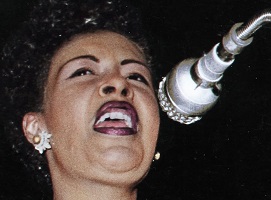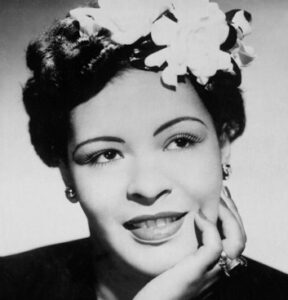Billie
 When asked why blues and jazz singers seem to live such hard, difficult lives of seemingly constant struggle, Billie Holiday famously replied that, “we like to live a hundred days in a single day.” Such was the notably short life of the jazz legend, revisited in James Erskine’s new documentary “Billie.”
When asked why blues and jazz singers seem to live such hard, difficult lives of seemingly constant struggle, Billie Holiday famously replied that, “we like to live a hundred days in a single day.” Such was the notably short life of the jazz legend, revisited in James Erskine’s new documentary “Billie.”
Why now?
Before you ask why now is an appropriate time to focus on Holiday, it should be noted that “Billie” is as much a film about Holiday as it is about writer/journalist Linda Lipnack Kuehl, who recorded (on cassette) hundreds of hours of interviews with those who knew Holiday best – everyone from Count Basie and Tony Bennett to former bandmates, family members, a psychiatrist, and even a pimp. Unfortunately, Kuehl died under mysterious circumstances in 1978, and her tapes have remained under lock and key ever since. Until now.
No surprises
As we hear interview clips, we see still photos and old film footage of Holiday with the interviewees, interspersed with footage of Holiday performing many of her classic songs. While the interviews are certainly interesting – even to those unfamiliar with her story – I can’t say I learned anything I didn’t already know, or assumed. In other words, I can’t say I was intimately familiar with the fact that Holiday was pimped for prostitution during her teens. But that fact does not surprise me. I can’t say I knew her adult love life would take her from one physically and emotionally abusive relationship to another. But I was not shocked to know this.

CIRCA 1939: Jazz singer Billie Holiday poses for a portrait in circa 1939 with a flower in her hair. (Photo by Michael Ochs Archives/Getty Images)
Holiday was a noted drug user – at first succumbing to the pleasure of performing high (via marijuana). As her career progressed, she turned to harder drugs such as cocaine and heroin. As the concert footage progresses, we hear the strain in her once-beautiful voice. By the time of her 1959 death at the age of 44, her singing was reminiscent of that of an old lady. “One hundred days in a single day.”
Beautiful music
I find Billie Holiday to be a tragic yet fascinating individual. Her voice – early in her career – was unmatched. That sense of longing combined with a warm sensuality has never been duplicated. I could listen to her sing all day.
But the interviews are another matter. Since they are audio only, Erskine must add supporting video alluring enough to hold our interest. For the most part he succeeds, although just once I would have liked to see an interview – even a 40-year-old interview – with Basie, Bennett, Artie Shaw, Benny Goodman, or whomever. “Billie” has a static nature to it that might render it a worthy Public Broadcasting documentary – but not necessarily one that lends itself well to the big screen.
Kuehl’s story
At first, I was also put off by Erskine’s constantly bringing us back to Kuehl’s story. We learn she came from an upper-class Jewish family – and had almost nothing in common with Holiday. Save for her love of the music, and that beautiful, sultry voice. We learn that Kuehl’s writing career was just taking off when she was found dead. But why I should care about Kuehl’s story as much as that of Holiday is never determined.
However, as “Billie” progressed I found the juxtaposition of the two biographies to be mildly compelling. While the trajectories of their lives could not have been more different, their tragic endings were eerily similar. And Erskine even hints that Kuehl’s uncovering of various facets of Holiday’s life might have even led to her death, even two decades following that of her subject.
Furthermore, the occasional revisiting of Kuehl’s narrative serves to remove us from the increasingly calamitous and somber curve of Holiday’s. Watching “Billie” is akin to watching Asif Kapadia’s 2015 documentary “Amy,” which chronicles the heartbreaking and brief life of British singer Amy Winehouse. We want to help the subject; we know how her story ends; and we know there’s nothing we can do. If nothing else, Kuehl’s story alleviates, albeit temporarily, the pain of revisiting Holiday’s slow decline.
Mixed bag
“Billie” is a mixed bag. Fans of Holiday’s will love hearing the interviews and (especially) seeing colorized footage of some of her greatest performances. But again I fall back on my observation that this material is perhaps better suited for the small screen. There simply isn’t enough here – i.e. almost no video interviews – to warrant a trip to the local cineplex.
Andy Ray’s reviews also appear on https://www.youarecurrent.com/category/nightandday/film-reviews/